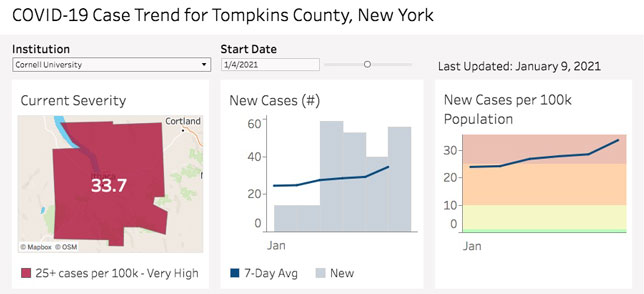Free COVID Dashboard Resources Offer Templates for College and County Data

Sample county-level COVID dashboard template
A project dedicated to sharing best practices in COVID-19 data visualization is offering free resources to help colleges and universities create their own dashboards for disseminating public health information to students, parents, faculty and staff. The initiative, dubbed We Rate Covid Dashboards, is a joint effort by Yale University faculty and public health experts across several higher education institutions.
We Rate Covid Dashboards does just that — grades the effectiveness of public-facing dashboards at United States colleges and universities based on a variety of criteria: readability, frequency that data is updated, types of data included and more. To date, 349 college dashboards have been rated; the majority have received grades in the B range, and a handful have received near-perfect scores. The ratings can be sorted by criteria or filtered by state, conference or other affiliations.
The We Rate Covid Dashboards team has put together two free Tableau-based templates for adding COVID data to a dashboard: one for college-level data, and one for county-level data. If institutions don't find the data for their specific school/county, they can submit their school name to be added to list within one business day. The resource page also includes a list of free data visualization software and accessibility resources with links to additional information.
"COVID dashboards are important: As we all know, there's a tremendous disease burden across our society at large, but also across college campuses. The COVID burden is substantial, it needs to be tracked, it needs to be transparently tracked and conveyed to the larger community," noted Cary Gross, professor of medicine and public health at the Yale School of Medicine and co-founder of We Rate Covid Dashboards, in a recent webcast about the project. "But COVID dashboards are also important for colleges because colleges exist to educate, to generate knowledge and share knowledge. So during this time of uncertainty and of a pandemic, the mission of a college overlaps with this mission of public health and safety. Transparency, I would argue, is a fundamental mission of colleges when it comes to their behavior during the pandemic."
For more information, visit the We Rate Covid Dashboards site.
About the Author
Rhea Kelly is editor in chief for Campus Technology, THE Journal, and Spaces4Learning. She can be reached at [email protected].